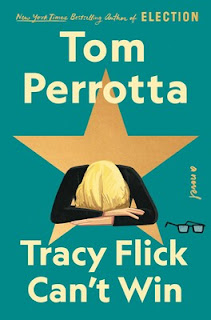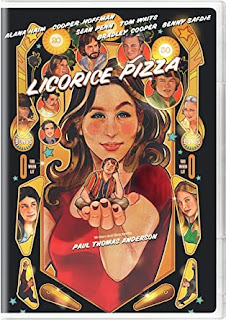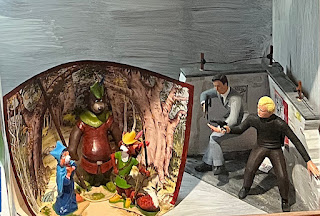TRACY FLICK CAN’T WIN (2022)
By Tom Perrotta
Simon and Schuster, 262 pages.
★★★
In the 1932 Marx Brothers film Horse Feathers Professor Wagstaff (Groucho) is the new president of a college that hasn’t had a winning football season in many years. He tells shocked colleagues that the school can’t afford both education and football, so he intends to tear down the college and build a stadium.
Tracy Flick* has an analogous problem. She has been the loyal assistant principal to Jack Weede for many years. Jack is retiring and Tracy is in line to move up, but the school board and community are more anxious to fire its football coach and return Green Meadows High School (GMHS) to the glory it knew before previous coach Larry Holleran bolted to head a college gridiron program.
Still, Tracy is a shoo-in to replace Jack if she can bite her tongue and win over board president Kyle Dorfman. Tracy is whip smart, has a Ph.D., and nearly finished a law degree at the University of Chicago. She likes working at GMHS, but she does have a cold personality and a blunt manner. Tracy slips a bit when she tells Kyle she has some ideas on improving the curriculum—especially for high-ability students—but admits she doesn’t care much about football. Oops! He does care and longs for a new Holleran.
In an attempt to redeem herself she accedes to an idea of Kyle’s she doesn’t think has merit. He wants to up the school’s profile by setting up a hall of fame to honor notable people associated with GMHS. The problem is that GMHS isn’t a bad school, but neither has it been a distinguished one. This becomes obvious (and amusing) as nominations come in. In Kyle’s mind the obvious choice is Vito Falcone, who quarterbacked the football team in its glory days and had a brief NFL career. Tracy finagles the idea of having two inductees and champions a longtime administrative assistant known to all as Front Office Diane.
If you know much about the inner workings of bureaucracies, search committees, or ad hoc committees you know each has the capacity to complicate simple things and that even decisions set in stone are precarious until cemented into place. Bickering and discontent ensue, but the hushed backroom plotting is even worse. Tracy finds it hard to “be the flame” swaying in the wind as she has been advised to become. Matters are complicated by personalities, many of which are out of accord with reputations. Among those suffering from the catchall malady “issues” include Vito, Jack, Diane, Kyle, his wife Marissa, a student named Lily, and Tracy. The usual complications emerge: not-so-secret affairs, old wounds, revenge fantasies, hidden agendas, and let’s not forgot a losing football program. Perrotta wends his way to a conclusion that’s partly predictable and partly surprising.
I am a Tom Perrotta fan, but I had mixed feelings about Tracy Flick Can’t Win. It’s short and breezy but also flat in ways that are more visceral than easy to articulate. It is fair to say that if we ignore personality deficiencies there’s not much going on in the novel until the very end. Moreover, after a while the bickering, scheming, and anxiety begin to grate. Even Tracy, our protagonist, comes off as calculating and entitled. Others will be revealed to be either deeply flawed or imposters.
I think that Perrotta wanted to write a novel about powerful men versus talented women who have to force their way into the Boys’ Room in order to shine. If that was the goal, too many punches were pulled that should have landed with force. In my estimation it would have helped to have emphasized Tracy’s likable qualities earlier in the book. I won’t say if she “wins” or loses, but it’s certainly the case that some readers will conclude that GMHS should wipe its slate clean on every level. To return to Horse Feathers, Groucho’s big musical number was “Whatever It Is, I’m Against It.” That is the stuff of comedy, but it’s marshy ground for readers in search of sympathetic characters.
Rob Weir
*If the name is familiar, she appeared as a high school student in Perrotta’s 1998 novel Election and was played by Reese Witherspoon in a 1998 movie adaptation.















